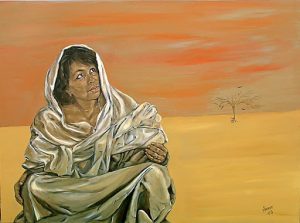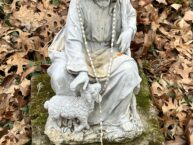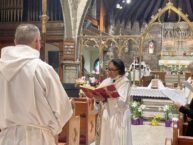 June 21, 2020: May God’s words be spoken, may God’s words be heard. Amen.
June 21, 2020: May God’s words be spoken, may God’s words be heard. Amen.
“Do not think that I have come to bring peace to the earth; I have not come to bring peace, but a sword. For I have come to set a man against his father… Whoever loves father or mother more than me is not worthy of me; and whoever does not take up the cross and follow me is not worthy of me. Those who find their life will lose it, and those who lose their life for my sake will find it.” Well, isn’t THAT just a lovely thing to hear from Jesus on Father’s Day, right?
Now, I know Jesus had two “dads,” (or two moms, depending on how one chooses to box God into a gender), but seriously, this is not what he should write on any card he may choose to send, nor would I recommend it to any of you. Of course, we also need to have a better understanding of what he was talking about, because he isn’t telling you to kick up a fuss at the Dad’s day Zoom party you may be planning for later this afternoon.
And perhaps the best way to understand it, is by looking at the story from Genesis in which we hear again about Hagar, the slave of Sarah. Now, you may have noticed that during communion, when I pray the Eucharistic Prayer Form 1 from Enriching Our Worship, as we use in these summer months, I add the name of Hagar to this part: “Through Abraham and Sarah you called us into covenant with you.” I say, “Through Abraham, Sarah, and Hagar,” and the reason why is because of her story found in Genesis, part of which we heard today. And Hagar’s life is one that should always be remembered, particularly now.
Just to backtrack a bit, here is the Cliff Notes version of how poor Hagar ended up where she is in the story we heard today: Previously, on the Genesis Channel, God tells Abraham the he would be the Father of all nations, and a whole lot of other great stuff, and to take his wife Sarah and all their belongings, and head to the land of Canaan, which, not for nuthin’ was already inhabited by, well, Canaanites, but that’s another story for another day. One more thing – they were called Abram and Sarai then, but let’s not go there. So, off they went, and pardon the pun, but LOTs of things happen along the way, including that God tells them they will have a child in their old age.
Now, here’s the thing, the bible says Sarah is barren, which is why God will provide a child. It is always the woman’s fault in the bible, so you know, and to prove it, there is always another woman who is given over like property to the guy to get pregnant, just to make the point. Yet God was going to ensure that Sarah herself got pregnant by Abraham. Still, not being ones to trust God, Sarah gives her Egyptian slave Hagar to Abraham to have sex, and Hagar does end up pregnant.
Cool, right? Wrong. Because Sarah was not as happy as one might think about this whole thing and beat the daylights out of Hagar, who then fled into the wilderness to escape. There she is weeping when God shows up. And in a neat bible trivia thing, she is the only person in our bible, this woman, this slave, who names God! She calls God El-roi, which roughly means the God who sees me. Sadly though, God sends her back to mean old Sarah, but does give her the same promise God made to Abraham.
Meanwhile, back at the old tent ranch, Sarah also got pregnant (Abraham was being kept very busy). Hagar had her child, and he was called Ishmael – but no, he never was on a whaling ship, just sayin’. Then Sarah had her child and named him Isaac, who later spent lots of money on psychotherapy after a certain trip to the mountaintop with his crazy dad – again, a story for another day.
And now, for today’s episode…
Sarah got jealous – again – of Hagar and her son, and ordered Abraham to send them away. Now, in the Ancient Near East, abandoning anyone, particularly a woman and/or a slave, much less with a child, into the wilderness was essentially a death sentence. As Hagar and her son were nearing the last breathe on this earth, God again appears to her, provides a well with water for them to drink, and the two, Hagar and Ismael that is, lived happily ever after.
If you think that was a long story, remember that was just the Cliff Notes version! But we need to understand the context of what we hear to really get at what it means for us – especially when it comes to such an important person like Hagar – one of my absolute fav biblical peeps. We need to get to know her, because she is still with us today, and her voice, her cries in the wilderness, need to be heard.
And yesterday I heard her voice loud and clear, while participating in the Poor People’s Campaign Virtual March For Moral Revival. Now, that event was a call to action from the Poor People’s Campaign, a movement started by the Rev. Dr. Martin Luther King, Jr., and revived by the Rev. Dr. William Barber and The Reverend Dr. Liz Theoharis.
I hoped you watched it, I truly do, not only because it was inspiring, but because over and over again personal stories were shared from across the country of those who are suffering from economic and environmental injustice and the oppression of bigotry and hate – from miners to farmworkers, teachers to students, undocumented immigrants to citizens, people of many races, differing gender identities, different ways of loving in the world, and those who had been incarcerated. They spoke of the pain and suffering of poverty and neglect caused by our societal indifference to economic injustice, our collective greed, and our nation’s overwhelming dump of available resources into an already swelling defense budget and major corporations.
And in their stories we heard Hagar’s voice crying out in the wilderness. For you cannot hear this story in Genesis and not see it being played out over and over again though time and even today. So let’s really tell it the way it was – Abraham & Sarah were well off. They had lots of possessions, including possessing human beings – slaves. Hagar, a woman of another race, was no free woman, but Sarah’s servant. She was beaten, raped (and yes – that is exactly what it is when one has no agency over the use of their own body), and then tossed out like trash. That is the story of Hagar – the one we don’t like to tell.
And she is here now in the stories we heard yesterday, like that of Christine Riccio, a woman from North Carolina, who has lived in poverty since she was 10 years old, living in a tent with her family.
We hear Hagar in the story of Lakin Dillingham a young person from Kentucky, who had to use a gym to shower before school, and sit in a McDonald’s parking lot at night for the Wi-Fi so he could complete his homework.
We hear Hagar in Terrance Wise of Kansas City, an man with three children who describes himself as a second generation fast-food worker, who after multiple years of work, still only earns $9/hour. His fiancé Moe (Mo-ay), who holds two jobs, one of which is taking care of the elderly as a home care aide. She earns $10/hour for that – for taking care of the vulnerable. Neither of them have benefits, paid sick leave, or healthcare. As a result, Terrance hasn’t seen a doctor or dentist in 18 years. His daughters have memories of getting ready for school in the back of their purple minivan, while their parents got ready for work in the front.
We heard Hagar in Stanley Sturgill, from Kentucky, who suffers from black lung from 41years in the coal mines, with barely a living wage, and help to care for his illness.
And we heard Hager in Lois Swimmer, a Lakota native born, raised in the Cheyenne River Sioux tribe reservation of South Dakota – a mother, and a grandmother. She left the poverty of the reservation as a teenager. She works for only $470 a month, her partner makes $10.50/hour. Their rent is $600/month. There is never enough to cover all the bills.
These are the voices of Hagar today – they are white and black, immigrant and indigenous, gay, straight & trans – and there are millions upon millions more.
And it is to these, like Hagar, that God goes. God hears their cry, sees them, goes to them. God always goes to the Hagars of our world – not just once or twice – but every single time. And THAT, my friends, is what we are called to do too. That is what Jesus was calling us to if we are to follow him. As he said in today’s gospel, “whoever does not take up the cross and follow me is not worthy of me. Those who find their life will lose it, and those who lose their life for my sake will find it.”
We find our lives in taking up his cross, and following him, because as the gospel lyrics sung and said in the virtual march over and over again put it “Somebody’s hurtin’ our people, and it’s gone on for far too long. We will not be silent anymore!” We hear this as someone is hurting Jesus, for he is in the eyes of the least, the last, the lonely, and the lost, and we WILL NOT be silent anymore, while he is crucified again and again!
No, we will not be silent, but we must start by recognizing our own inner Abraham and Sarah – and that is a place we do not like to go to, because it is hard for us all to understand the way in which we are a part of systemic oppression, even when we ourselves may be oppressed. Yet even while each of us may have our own story – our own Hagar moments – we also know that intentionally or not – we participate in a system that is engineered to perpetuate and even expand the economic imbalance that pushes the Hagars today into the wilderness of poverty, homelessness, addiction, incarceration, and marginalization while we blindly continue on.
We must stop, for we are hurting our people, and it’s gone on for far too long.
And the first step is to do as God did – go into the wilderness to see, to listen, and to act.
We need to open our eyes to see that 60 million people in our country earn less than a living wage.
We must open our eyes to see that ¾ of the people in the US who are poor are women and children.
We must open our eyes to see that our trash, our waste, our toxic dump sites do NOT go into our backyards, but into the places where there is no money to fight against it.
We must hear the cries of the undocumented immigrants who pay more in taxes than all of the richest 1%, but are denied the benefit of public services which those taxes support.
We must hear the cries of our sisters and brothers who are denied dignity and respect, are beaten and killed, are pushed to the margins, because of the color of their skin, who they love, what faith the profess, or their physical or mental challenges.
We must hear the hear the cries of the 10 million who are homeless, aching for the safety and warmth of a roof over their heads, while 18 million homes in the US remain vacant.
We must see them, hear them, and then we must act!
“Somebody’s hurtin’ our people, hurtin’ Jesus, and it’s gone on for far too long. We will not be silent anymore!”
We will not be silent – and we will not be told that the very dream of God for Her people is impossible, for we know nothing is impossible in Christ Jesus. Nor will we be told we just don’t get how it all works. Oh, we get it alright, we have just had enough of it.
Most of you know I worked in corporate America for over 20 years. My last day in that system was when many were laid off, including me, after our company, AIG, got an $85 billion dollar bailout from the Federal government, even while they made a profit of $23 billion in the prior quarter. That’s $85 billion government dollars!
When I was younger, I worked in Washington, DC, for both government contractors and lobbying firms. In one job, I was asked to help a department in a large federal agency find a way to meet the required 10% reduction created by the Gramm-Rudman-Hollings Balanced Budget Act. In one month, I found $14 million in bills charged for things the government had not yet received. That’s $14 million dollars!
I also saw how government works. I do know, and believe, that the extremes inform, but governing that works well comes from the center. But that does NOT mean that systemic and life-giving change must wait for years upon years while people are dying. Folks, as someone said yesterday – this isn’t a right or left thing – this is a right or wrong thing, and we can and will do better – we will not be silent anymore, because “somebody’s hurtin’ our people, hurtin’ Jesus, and it’s gone on for far too long!
We will not be silent – but will follow God into the wilderness to stand with our sisters and brothers – to see them, hear them, and act to change what is to what can be.
We will not be silent – but will take up the cross of Jesus and follow him, overturning the tables of economic injustice, tearing down the walls that divide us, and being a healing balm of love, and a light of hope for those who live in darkness.
We will not be silent – but will follow the Holy Spirit into the hallowed halls of congress, and past the stone columns of state capitols, until our government stops aiding and abetting the crimes against humanity with budgets and regulations that perpetuate economic injustice.
“Somebody’s hurting our people, hurtin’ Jesus, and it’s gone on for far too long. We will not be silent anymore!”
No, we will not be silent anymore!
For that is the cross we must take up, or we will surely die.
Amen.
For the audio from the 10:30am service, click below, or subscribe to our iTunes Sermon Podcast by clicking here:
The Rev. Diana L. Wilcox
Christ Church in Bloomfield & Glen Ridge
June 21, 2020
Third Sunday After Pentecost – In A Time Of Separation
1st Reading – Genesis 21:8-21
Psalm 116:1, 10-17
2nd Reading – Romans 6:1b-11
Gospel – Matthew 10:24-39






